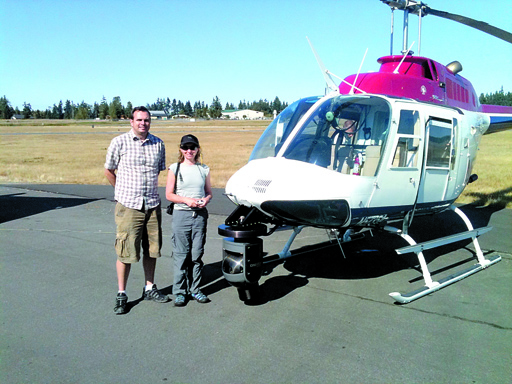PORT TOWNSEND — This movie, with its native script and green, serpentine stream, is no ordinary picture.
“River as Spirit: Rebirth of the Elwha” is a blend of a helicopter flight over the mountains, a careful translation of the Klallam language — and a shared desire for a renewed Elwha River.
“River as Spirit” is more river than words. There isn’t a lot of talk.
What narration there is is in Klallam, spoken by Lower Elwha Klallam tribal member Jamie Valadez.
English subtitles help tell the story, which will light the screen at the Rose Theatre, 235 Taylor St., at noon Sunday. Admission will be $9.
The 30-minute film takes the viewer all the way down: from the Elwha’s headwaters high in the Olympic Mountains to its mouth at the Strait of Juan de Fuca.
“The river is the star of the film,” said biologist Shelly Solomon, whose Marrowstone Island company, Leaping Frog Films, produced “Spirit.”
From the time she conceived this project, Solomon wanted to work with the Elwha tribe, which has lived along the river for thousands of years.
She hoped to integrate her footage of river and wildlife with the Klallam language, which Valadez has taught at Port Angeles High School for 14 years now.
But “it takes awhile for the tribe to trust,” Solomon said.
Her hopes came to fruition. Solomon and Valadez worked last year with Elwha Klallam elder Adeline Smith on translating the movie’s script into their native tongue.
“It took us awhile,” Valadez said with a smile.
She showed “River as Spirit” to students in her Native American studies and Klallam I courses at Port Angeles High.
Some of these teenagers are tribal members, and know the Elwha story well, yet “some of the kids have never been to the river,” Valadez said.
“They like the part at the end, when the salmon are spawning. They had never witnessed that.”
Following the movie’s flight over the water, Elwha Klallam Tribal Chairwoman Frances Charles is seen standing beside the river.
As it sparkles in the sun, she speaks about the tribe’s efforts to return the Elwha to its free-flowing state.
Two dams were built, and salmon passage blocked, by 1927.
After the tribe’s and other environmentalists’ long battle, Congress passed the Elwha River Ecosystem and Fisheries Restoration Act in 1992.
The river restoration project, now a $325 million National Park Service-Bureau of Reclamation effort, began bringing the dams down in 2011.
The Elwha Dam was completely dismantled in March. Glines Canyon Dam farther upstream is expected to be fully removed next year.
As she watched dam removal get under way last year, Charles’ thought was, “Is this really happening?”
She saw tribal elders cry, and she wanted to weep with them, in joy and humility.
Healing the Elwha River means healing the people who live beside it: This is “River as Spirit’s” closing message.
“Spirit” is Solomon’s passion these days — but it’s not her only film about restoration.
On Sunday, she’ll also show “Buried in Sawdust for 50 Years,” a 31-minute documentary about the cleanup of a Discovery Bay estuary that had been filled with mill waste for half a century.
DVDs of both “River as Spirit” and “Buried in Sawdust” are available via Solomon’s website, www.LeapingFrogFilms.com, for $19 each.
More information is also available at 360-385-3998.
For details about Sunday’s screenings, visit www.RoseTheatre.com or phone 360-385-1039.
Features Editor Diane Urbani de la Paz can be reached at 360-452-2345, ext. 5062, or at diane.urbani@peninsuladailynews.com.

